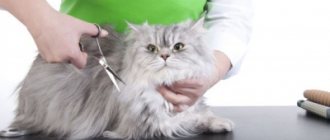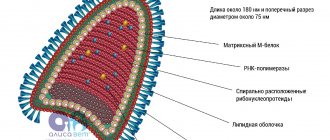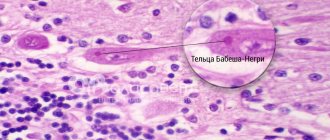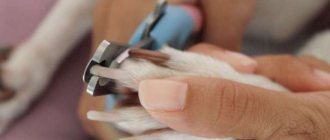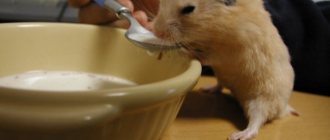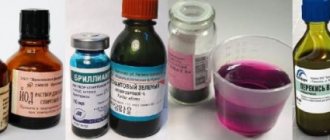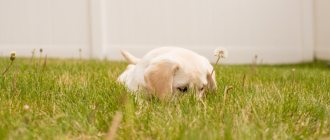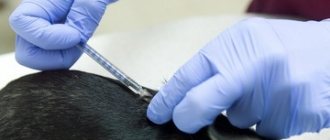Unfortunately, dogs are not immune to viruses and infections. Yorkshire Terriers are no exception in this regard. For healthy growth and development, your pet must have vaccinations. Preventive vaccination not only makes it possible to protect a pet from many diseases, but also allows the owner to feel protected. After all, many infectious diseases can be transmitted from dogs to humans.
Basics
The immunity of newborn puppies is the result of feeding on mother's milk, which protects them from the effects of infections and diseases.
At the end of the lactation period, this protection gradually disappears, replaced by immunity that the puppies develop on their own.
Any vaccination has several basic rules:
- The pet must be absolutely healthy. A recent illness is the reason for a two- or three-week quarantine, which gives the dog’s body time to recover.
- You cannot vaccinate a pregnant or lactating bitch. During pregnancy, childbirth and feeding, the bitch's body experiences serious stress and needs rest. The best time to vaccinate a bitch is 2-3 weeks before mating.
- You should not vaccinate your puppy too early. Vaccination performed before the antibodies obtained from the bitch's milk have stopped working will not work, which will increase the risk of infection.
- Be sure to use the same drug for vaccination and revaccination.
- For 3 days before vaccination, it is necessary to carefully monitor the pet’s condition: he should have a cold and wet nose, a body temperature of 39 degrees, a good appetite and the usual level of activity.
Vaccination is the causative agent of the disease, and not a method of treating it; vaccinating an unhealthy dog can be fatal.
Things to remember
The owner of a Yorkie should take the following into account:
- vaccination is carried out only under sterile conditions;
- The dog’s immunity after vaccination remains for 12 months;
- Vaccination of bitches is carried out 14-20 days before mating.
Immune protection is formed 1.5 weeks after vaccination.
Immunity acquired through vaccination lasts up to 12 months.
The body of bitches carrying offspring is under extreme stress. Therefore, vaccination is possible only after the pregnancy has been delivered and the lactation period has ended.
If the Yorkie is a breeding dog and is expected to participate in exhibitions, then routine vaccinations should be carried out only in state veterinary clinics. Passport stamps made in private clinics are not taken into account at exhibitions.
Protection
The standard vaccination schedule includes the use of vaccines against the following diseases:
- Rabies . As a result of this disease, paralysis and death of the dog occurs, in addition, it is dangerous for humans.
- Hepatitis. The development of the disease is caused by a virus. There is damage to the liver, stomach and intestines, inflammation of the respiratory system, damage to the central nervous system, and the possibility of symptoms of conjunctivitis cannot be excluded.
- Parvoviral gastroenteritis . A characteristic sign of the disease is diarrhea mixed with blood and high fever.
- Plague. The disease, which often ends in the death of the pet, is accompanied by apathy, lethargy and convulsions.
- Leptospirosis. This disease is caused by parasites and the dog suffers from diarrhea, abdominal pain and high fever.
Notes on each vaccination performed must be included in the dog’s veterinary passport.
The choice of drug for vaccination depends on the owner of the Yorkie. The most commonly used are Eurikan and Nobivak.
Schedule depending on age, frequency
| Age | Vaccine purpose |
| 8 - 9 weeks | Protection against enteritis, plague, hepatitis, parainfluenza, adenovirosis, coronavirus, leptospirosis, microsporia and trichophytosis |
| 10 - 11 weeks | Repeat vaccination against microsporia and trichophytosis |
| 3.5 months | Revaccination against enteritis, distemper, hepatitis, parainfluenza, adenovirosis, coronavirus, leptospirosis |
| 4 - 5 months | Rabies vaccination |
| Six months | Revaccination against enteritis, distemper, hepatitis, parainfluenza, adenovirosis, coronavirus, leptospirosis |
Then all vaccinations are repeated when the dog reaches one year of age and then they must be done once a year at the same time, the maximum possible interval between vaccinations is 1 week.
note
Vaccination, especially the first one, should take place in a veterinary clinic under the supervision of a doctor. This need is due to the likelihood of an allergic reaction and even a state of severe anaphylaxis in the Yorkshire Terrier due to the administered drug. In this case, the veterinarian will be able to quickly provide the dog with the necessary assistance.
To prevent allergies, the animal is given ¼ of an antihistamine tablet - Suprastin or Tavegil - before vaccination.
Revaccination should be carried out with the same drug as the first vaccination. If you vaccinate your dog yourself, before purchasing the vaccine, you must check its expiration date. Then read the instructions and follow all prescribed storage conditions, otherwise the medication may lose its properties.
Drugs
Breeders and owners of Yorkies trust foreign vaccines more. It is believed that they are less likely to cause allergic reactions and are easier to tolerate.
The drugs require storage conditions - low temperatures.
If vaccination is carried out independently at home, when purchasing, you need to pay special attention to ensure that the vaccine is not expired.
After purchasing a bottle, it is sent to the refrigerator. Failure to comply with storage rules will lead to loss of effectiveness of expensive products.
The very first
The first vaccination should be given to the Yorkshire Terrier at the age of 8, maximum 9 weeks, it is intended to protect against diseases such as:
- Enteritis.
- Plague.
- Hepatitis.
- Parainfluenza.
- Adenovirus.
- Coronavirus.
- Leptospirosis.
- Microsporia and trichophytosis.
If the puppy has just arrived at a new home and it’s time to vaccinate it, you should wait a few days, giving the baby time to recover from stress and adapt to new conditions.
Vitamins
In order to strengthen the immune system of a growing Yorkshire Terrier, which is already relatively fragile, it is advisable to supplement drug therapy with a vitamin diet .
To do this you need to follow simple rules:
- to meet the dog’s need for carbohydrates, give it pieces of black bread with kefir;
- vitamin A comes into the body with a piece of carrot; this vitamin is also called a growth stimulator, it is very important;
- vitamin D2 is given drop by drop in oil every other day;
- a little seaweed will provide your pet with vitamin B and also make its coat brighter;
- A few drops of rosehip decoction is already vitamin C.
Read about how to properly feed your pet here.
So, if you take care of your terrier from the very first day of your friendship, give him vaccinations on time, this friendship will delight you with him for many years.
Preparing for the injection
For vaccination to be successful, the Yorkshire Terrier must be prepared for it.
If necessary, you must get rid of fleas 2 weeks before the vaccination date, and you cannot bathe your pet a day before the procedure.
One of the most important preparation points is timely deworming.
10 days before vaccination, you should get rid of worms using one of these drugs:
- Drontal.
- Vacation.
- Febtal.
- Prazicide - suspension.
Deworming should be carried out in the first half of the day, about half an hour before feeding or an hour after eating.
For rabies
The dog needs to be vaccinated against rabies at the age of 4 - 5 months; earlier vaccination may worsen the general condition of the pet due to the toxic effects of the drug. The drug Eurikan LR, which has a three-year duration of action, is often used.
Despite the period of protection against the disease, your dog must be vaccinated annually.
Vaccination is carried out only in veterinary clinics that have a special license. The medicine must be stored in the refrigerator, and its unsealing and filling of the syringe must take place in front of the dog owner, otherwise there is a possibility of administering a counterfeit or low-quality drug.
Restrictions for unvaccinated animals
Some owners are hesitant about whether their Yorkie needs vaccinations. After all, often these dogs are bought as indoor pets, they are not exhibited, they are not taken outside. But veterinarians warn that all pets need to be vaccinated.
Some regions have introduced administrative liability for lack of rabies vaccination. This also applies to decorative breeds.
Only a vaccinated animal can participate in an exhibition or travel with its owner on public transport. Without vaccination, Yorkies are also not allowed to breed. After the first vaccination, the dog is issued a veterinary passport, where all the information is entered.
After vaccination
After vaccination, it takes the dog's body approximately 2 weeks to produce antibodies.
At this time, it is necessary to exclude the possibility of the pet becoming hypothermic and being in a draft.
Walks are allowed, but they must be short and avoid contact with soil and grass.
It is necessary to avoid contact with other animals, as viruses can live on their fur, to which recently vaccinated puppies are sensitive. You cannot get the injection site wet for 3-5 days; you can bathe your pet 10-14 days after vaccination.
For puppies between 2 and 8 months of age, it is best to quarantine for two weeks.
Lump formation
After administration of the drug, a lump or lump may appear at the injection site for 5 to 7 days, then it begins to dissolve.
The appearance of a lump is a normal reaction of the body to the introduction of a foreign substance.
The seal should be lubricated with iodine 1-2 times a day. The lump may be itchy. To avoid infection, do not allow your pet to scratch the injection site.
- You should be wary if:
- The lump increases in size.
- The lump and the surrounding skin turn red.
- The dog is in pain and discomfort.
- There is purulent discharge at the injection site.
- Body temperature is above normal for more than 3 days.
If any of these signs appear, you should contact your veterinarian.
The dog's well-being
Lethargy and apathy are normal for a newly vaccinated Yorkie. It is necessary to carefully monitor the pet, provide it with comfortable conditions, peace and light, but rich and balanced nutrition. In rare cases, allergies may develop such as swelling of the muzzle or stomach upset. In such a situation, it is necessary to consult a doctor as soon as possible.
Lump formation
This phenomenon is not dangerous if it is just swelling of the injection site. Warning factors are:
- increase in the size of the cone;
- redness and infection;
- pain and discomfort;
- purulent discharge at the vaccination site
- fever for more than 3 days.
These manifestations require contacting a doctor.
You can avoid compaction by calming your pet before vaccination, using special syringes for dogs, and administering the drug professionally and slowly.

